Events
 Quirk Symposium 2023
Quirk Symposium 2023
Date: Friday 30 June 2023, 15:30-19:30
Location: The British Academy, 10-11 Carlton House Terrace, St. James's, London MAP
Generously funded by the Quirk Bequest and The Wolfson Foundation.
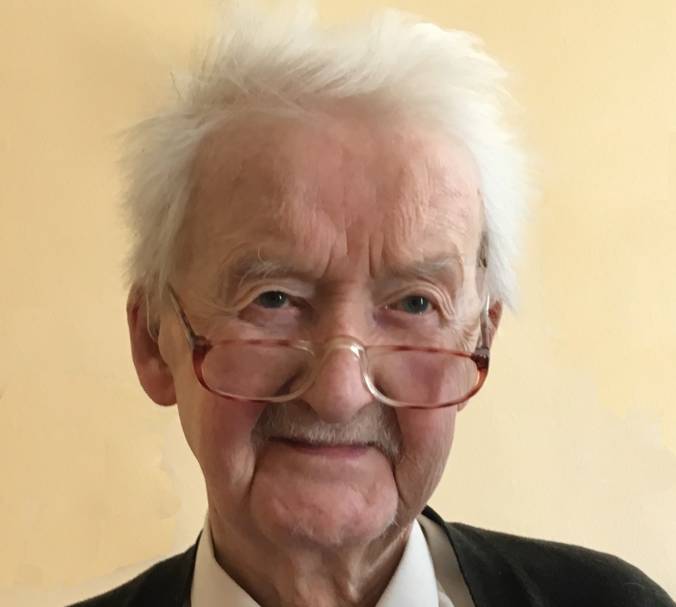 The Faculty of Arts and Humanities, The Survey of English Usage and the Wolfson Foundation were pleased to invite colleagues to a symposium at the British Academy in London in honour of Professor Lord Randolph Quirk CBE (1920-2017).
The Faculty of Arts and Humanities, The Survey of English Usage and the Wolfson Foundation were pleased to invite colleagues to a symposium at the British Academy in London in honour of Professor Lord Randolph Quirk CBE (1920-2017).
In 2019 we held a memorial event for Randolph, who died at the end of 2017, which was very well attended.
Randolph was born on 12 July 1920 on the Isle of Man. He studied at University College London, where he later became Quain Professor in English Language and Literature. He was Vice-Chancellor of the University of London from 1981 to 1985, President of the British Academy from 1985 to 1989 and a Trustee of the Wolfson Foundation.
Quirk became a Commander of the Order of the British Empire (CBE) in 1976 and was knighted in 1985. He became a life peer as Baron Quirk of Bloomsbury on 12 July 1994. He was married to the late Lady Gabriele Stein.
Quirk founded the Survey of English Usage in 1959 at UCL, and is known throughout the world for the monumental Comprehensive Grammar of the English Language (1985), which he co-authored with Sidney Greenbaum, Geoffrey Leech and Jan Svartvik. This book is one of the great standard reference grammars of English.
Randolph left a substantial bequest to UCL which funds a number of PhD scholarships and the Quirk Lectureship.
We have a short biography of Randolph on our website and a page of tributes to him.
The programme of the symposium on 30 June 2023 and photographs are below.
 Programme
Programme
15:30 Arrival and registration
16:00 Introductions by Professor Bas Aarts and Professor Stella Bruzzi
16:20 Professor Christian Mair
16:50 Professor Emma Moore
17:20 Dr Guyanne Wilson
5-minute break
17:55 Panel discussion
18:45 Drinks and canapés
19:30 Close



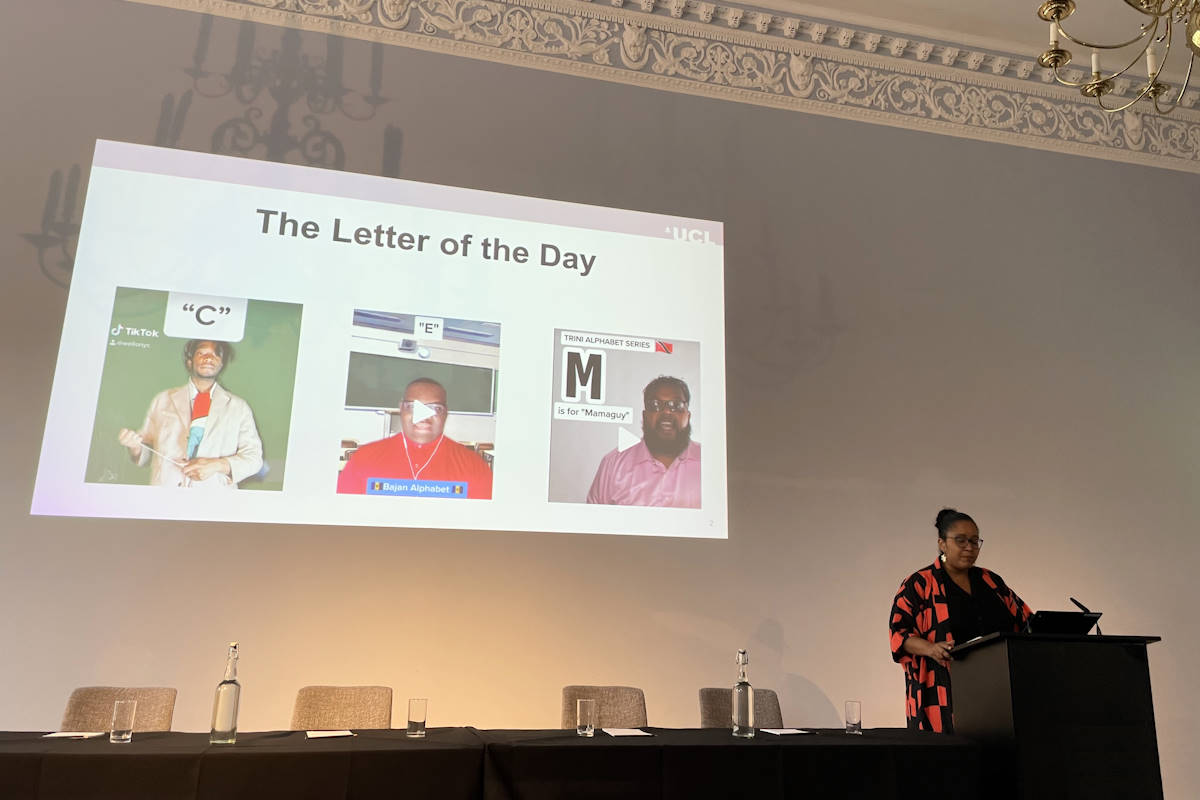
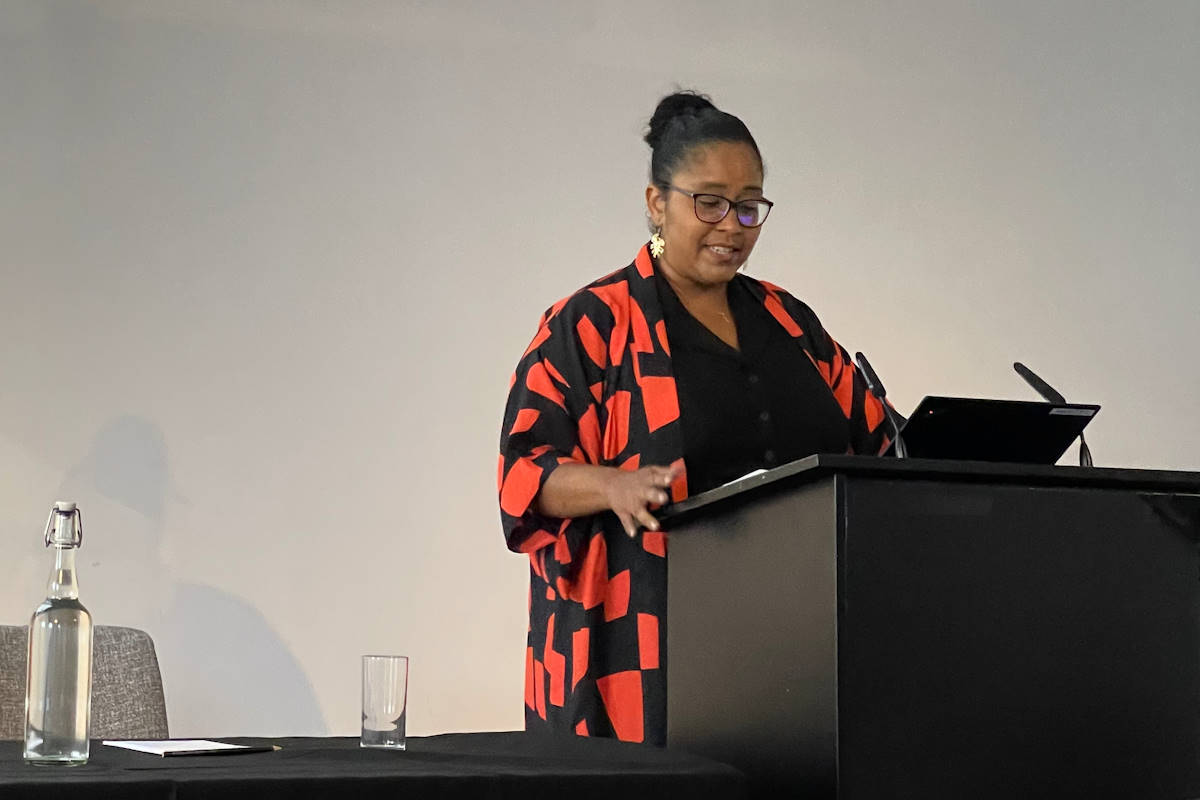
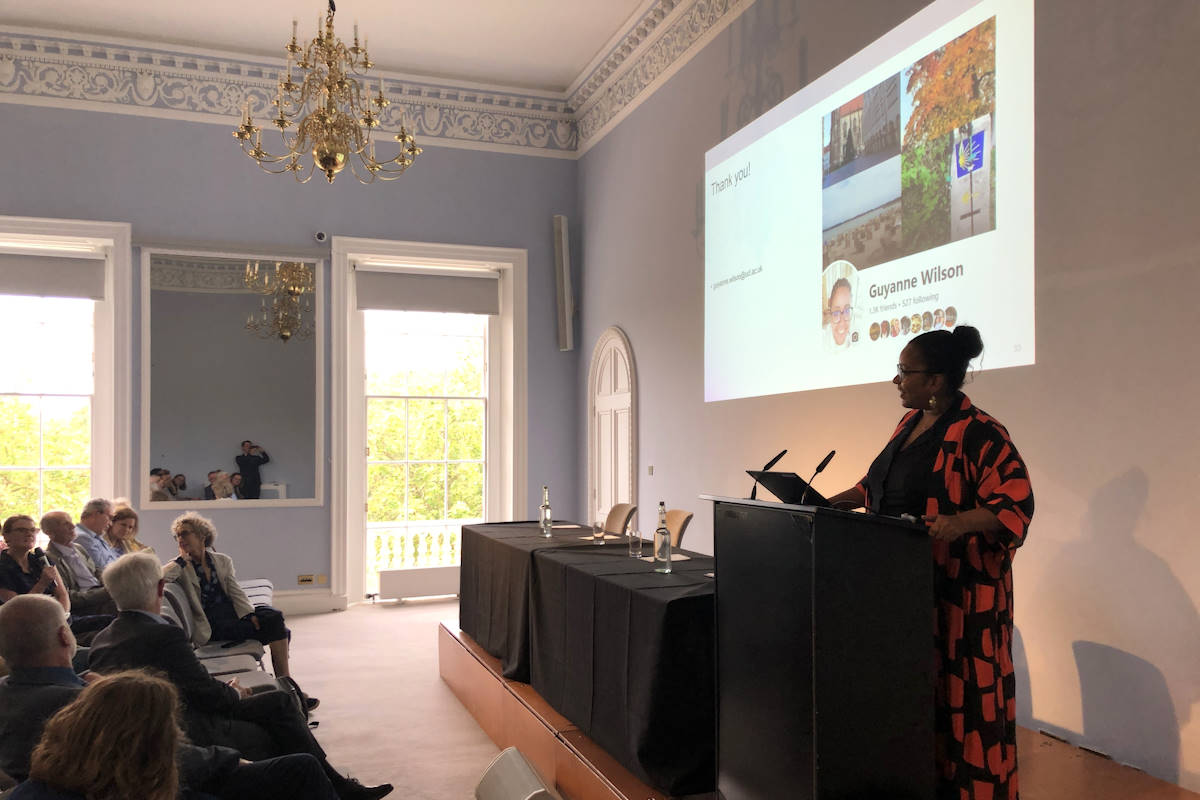

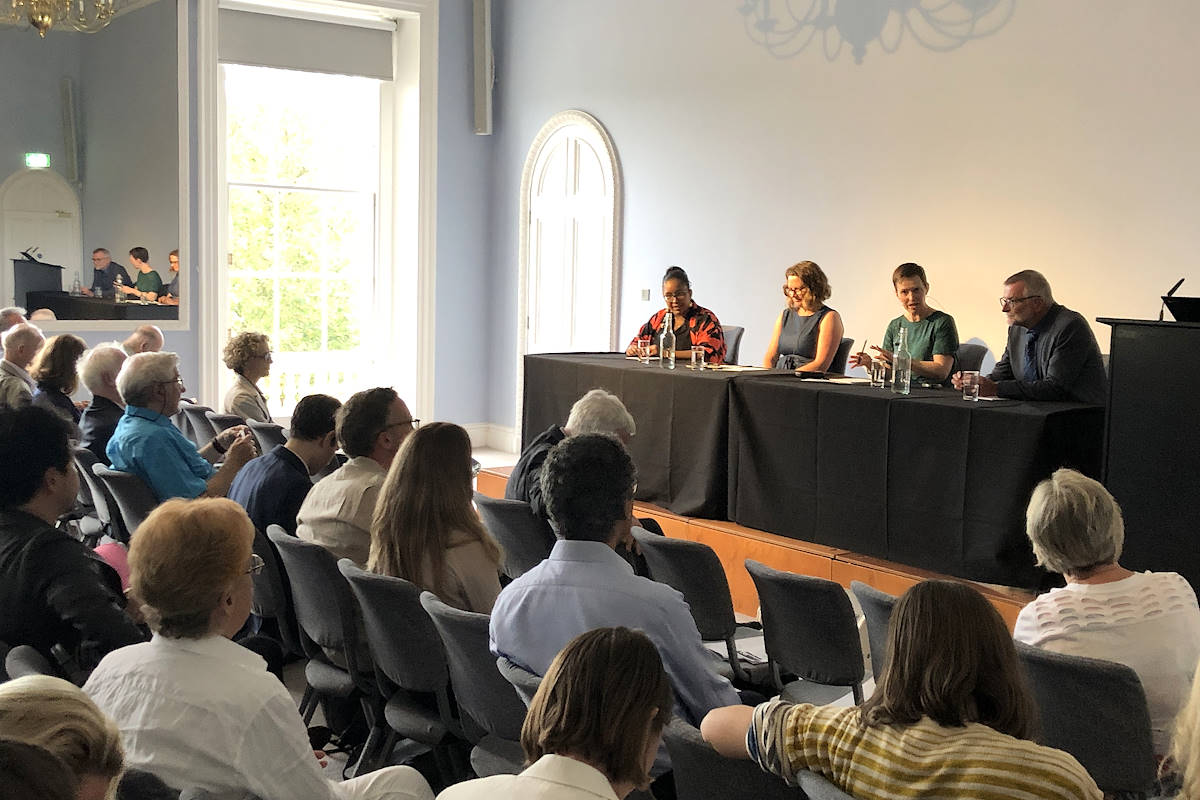
Abstracts
Christian Mair A Common Language 2.0? Global English 60 Years after Marckwardt & Quirk (1964)
In a series of broadcast conversations, subsequently published as A Common Language (1964), Albert Marckwardt and Randolph Quirk discussed what they perceived as the “miracle of English:” a language with an enormous geographical spread, serving numerous and diverse communities of native (ENL) and second-language (ESL) speakers, and yet held together under the roof of two equally prestigious and influential standards, British and American. Starting out from this assessment, I will show that English has remained a common language, in an even wider sense than envisaged by Marckwardt and Quirk. Today, it is advancing fastest not in its ENL and ESL uses, but as the only available lingua franca for a multilingual world. In this use, English has gained inevitable presence far beyond the historical British and US spheres of political and linguistic influence: for example in the European Union, in China and in the successor states of the Soviet Union. Other major forces that could not have been foreseen in the 1960s are the world-wide currents of migration set in motion by post-Cold War globalisation and the digital revolution in media and communications technology, which has made formerly marginal varieties of English visible and influential throughout the world. The result has been a standardisation paradox: English is becoming more homogeneous (usually along US norms) and more heterogeneous at the same time. As in the 1960s, the forces of standardisation remain strong enough to prevent the fragmentation of the language, but standardisation has become a more complicated process. It is no longer the prerogative of educated authorities in Britain and the US. There is now a pluricentric and hierarchically structured constellation of standards, and standardisation is increasingly being outsourced to software algorithms and Artificial Intelligence. Randolph Quirk’s reputation rests both on his impeccable scholarship and on his interventions in public debates on the politics and the future of the English language. This dual approach is obviously fruitful for research on a world language and remains an inspiration for linguists in the twenty-first century.
Emma Moore More than ‘impoverished language’: viewing grammar as a fluid, flexible social resource
‘Impoverished language’ is one of the most cited explanations for the educational underachievement of working class children (Hoff 2013; Avineri et al. 2015; Law, McBean & Rush 2011). Given that working class children are more likely to speak local dialects, this view indirectly associates local dialects with dysfunctional communication. Using data collected in primary schools, Snell and Cushing (2022) show this view persists, with many teachers conceptualising spoken local dialect as a ‘problem’ in the classroom. In fact, their classroom data revealed that teachers sometimes focus on the style of speech used over a child’s ability and willingness to engage in classroom dialogue.
Rather than reiterating the arguments used to denigrate local dialects, this talk will reframe the conversation to provide evidence for occasions when using local dialect forms could actually be conceptualised as an advantage. I will present data from a corpus of recordings from high school children which demonstrate how these young people use a wide range of grammatical forms to express variability in who they are, what they want, and how they feel. This data will suggest that children learn to design their language to fit their developing personas as they transition from child to adult. I will argue that the intertwined nature of language and persona is perhaps the most powerful constraint on language use in the school years, yet the power of this constraint is almost completely ignored in educational policy.
Whilst educational policy suggests that giving children access to standard English is sufficient to make them use it (Department for Education 2017), my data will show that some (even most) children use standard English selectively, not through ignorance of it, but because the social values it indexes for them differ from those proposed in schooling. I argue that, if our goal is to facilitate the use of standard English in specific educational tasks (and few would argue against this goal), then we need to build on how children already employ their linguistic repertoires in relation to interactional positioning and alignment. By allowing them to understand the constraints on this variation, and encouraging them to identify and value the skills already at their disposal, it becomes possible to situate fluidity and flexibility at the heart of all linguistic practice, rather than situating deviations from standard English as an indicator of linguistic deficiency.
References
Avineri, Netta, Eric Johnson, Shirley Brice-Heath, Teresa McCarty, Elinor Ochs, Tamar Kremer-Sadlik, Susan Blum, et al. 2015. Invited Forum: Bridging the “Language Gap.” Journal of Linguistic Anthropology 25(1). 66–86.
Department for Education. 2017. Unlocking talent, fulfilling potential: A plan for improving social mobility through education. London: Department for Education. » e-published
Hoff, E. 2013. Interpreting the early language trajectories of children from low-SES and language minority homes: implications for closing achievement gaps. Developmental Psychology 49(1). 4–14.
Law, James, Kirsty McBean & Robert Rush. 2011. Communication skills in a population of primary school-aged children raised in an area of pronounced social disadvantage. International Journal of Language & Communication Disorders 46(6). 657–664.
Snell, Julia & Ian Cushing. 2022. “A lot of them write how they speak”: policy, pedagogy and the policing of ‘nonstandard’ English. Literacy 56(3). 199–211.
Guyanne Wilson Language identities and ideologies on social media: Focus on Caribbean TikTokers
Social networking sites such as Instagram and TikTok provide an important space for the development and maintenance of a diversity of linguistic identities. In World Englishes research, important work examining how identities are performed on social media has already been done (e.g. Bhatia 2020; Heyd 2014; Honkanen 2020; Kathpaila 2022; Lee 2019), though the focus has been mostly on written language found in chatrooms (e.g. Honkanen 2020) and comments’ sections (e.g Chau 2021). Moreover, except for research done on Jamaican English Creole in blogs and chatrooms (e.g. Hinrichs and White-Sustaita 2011; Moll 2015) and a single article by Oenbring (2013) on Bahamian English Creole, Caribbean Englishes in computer-mediated communication (CMC) have been overlooked. This study examines how ideologies about language use in the southern Caribbean (Barbados, Trinidad, and Guyana) are circulated on social media, and how language in social media posts indexes elements of identity. Specifically, it looks at language ideologies and identities among Caribbean social media users, paying particular attention to TikTok videos generated by Trinidadian, Guyanese and Barbadian TikTokers in the Caribbean Alphabet series. The data were examined using a multi-modal, mixed methods approach that drew upon qualitative content and semiotic analytic approaches. Initial results suggest that in online spaces at least, speakers draw upon Creole to do quite sophisticated identity work: posters use language to distinguish themselves as a community distinct from other Caribbean and non-Caribbean English-speaking communities by highlighting lexical items unique to their territories, but also by using phonological and grammatical features associated with the respective territorial varieties. Moreover, they distinguish themselves from groups of speakers within their own communities. The study shows how data from social media can be productively used to study language ideologies and identities in the Caribbean and problematises contemporary understandings of language prestige in Caribbean contexts.
References
Bhatia, A. (2020). Vlogging and the discursive co‐construction of ethnicity and beauty. World Englishes, 39(1), 7-21.
Chau, D. Spreading language ideologies through social media: Enregistering the ‘fake ABC’ variety in Hong Kong. Journal of Sociolinguistics. 2021; 25: 596– 616.
Heyd, T. (2014). Doing race and ethnicity in a digital community: Lexical labels and narratives of belonging in a Nigerian web forum. Discourse, Context & Media, 4, 38-47.
Hinrichs, L., & White-Sustaíta, J. (2011). Global Englishes and the sociolinguistics of spelling: A study of Jamaican blog and email writing. English World-Wide, 32(1), 46-73.
Honkanen, M. (2020). World Englishes on the Web: The Nigerian diaspora in the USA. John Benjamins Publishing Company.
Kathpalia, S. S. (2022). Satiric parody through Indian English tweets in Twitter. World Englishes. Early View.
Lee, J. S. (2020). Digital communication, social media, and Englishes. World Englishes, 39(1), 2-6.
Moll, A. (2015). Jamaican Creole Goes Web: Sociolinguistic styling and authenticity in a digital 'Yaad' (Vol. 49). John Benjamins Publishing Company.
Speaker Biographies
Christian Mair
Christian Mair is Professor in English Linguistics at the University of Freiburg in Germany. His research over the past two decades has focussed on the corpus-based description of Modern English grammar and on variability and change in Standard Englishes world-wide. From 2006 to 2012, he was a member of the Wissenschaftsrat, an advisory body to the German Federal Government and state governments. From 2011 to 2014 he served as President of ISLE, the International Society for the Linguistics of English. Mair’s current research focusses on the role of global English in a multilingual world, on multilingual and nonstandard language practices in computer-mediated communication, and on the sociolinguistics of diaspora and migration, where he is advocating the use of corpora and digital tools to complement existing approaches.
Emma Moore
Emma Moore is Professor of Sociolinguistics at the University of Sheffield. Her research explores how individuals and communities use language to construct social styles and identities. Her book, Socio-syntax: Exploring the social life of grammar, will be published by Cambridge University Press in 2023. Emma has also co-edited four Cambridge University Press volumes: Analysing Older English (2011); Language and A Sense of Place: Studies in Language and Region (2017); Categories, Constructions, and Change in English Syntax (2019); and Social Meaning and Linguistic Variation: Theorizing the Third Wave (2021). She is also currently co-editing the Oxford Handbook of British Englishes (forthcoming, 2024).
Guyanne Wilson
Guyanne Wilson is lecturer in English Language and Linguistics at UCL. Prior to this, she worked at several universities in Germany, where she completed her PhD and attained her Venia Legendi in English Philology, and where she contributed to the compilation of the Trinidad and Tobago and Ugandan components of the International Corpus of English. Her main research interests are grammatical variation in World Englishes, Caribbean Englishes on the internet, research methods in New Englishes, and language attitudes and ideologies.
This page last modified 14 May, 2020 by Survey Web Administrator.